There’s a word I’ve been thinking about lately. Hospitality. It’s one of those words that’s used so often it’s easy to forget it once meant something sacred. Before it became an industry, before it was something we charged for or packaged into a brand, hospitality was a way of being in the world. From the Latin hospes, which means both host and guest, from a time when the word held both sides of the exchange, because the two were inseparable. To welcome another was to be changed by their presence. From hospes we get hostel, hospital, hospice, all places of care, refuge, and restoration.
Looking back, to me, that reciprocity has always been the heart of good cooking. When I was younger, working in restaurants, I didn’t yet have the words for it. I thought of myself as a craftsman, with an ever-broadening range of skills the more hours, days, months, and years I spent in the kitchen. The job was to make good food, and good food meant something seasonal, balanced, and tasty enough that people wanted to come back. But even then, there was something deeper happening. Each night we’d open our doors, and in would come a cross-section of the town. Couples on dates (especially on St Dwynwen’s Day, Welsh Valentine’s Day), families celebrating, old friends catching up, people seeking comfort, people seeking spectacle. They’d hand over their coats and, for a few hours, trust us to feed them. That trust, an almost invisible thing, is the cornerstone of the craft.
Hospitality, beyond what goes on the plate, is the unspoken contract between two humans: I will care for you for a little while. I’ll see to it that you’re warm, fed, and safe. I’ll give you a piece of the land as food, and in return, you’ll give me a reason to keep doing what I do. That’s what the old proverb means when it says the guest is god. Beyond the concept of worship and deity, it’s about reverence. To host is to recognise something divine in the act of giving.
Years later, when I left my work in restaurants and began to cook more directly from the land I learned to tend, I started to understand that hospitality doesn’t begin at the door or end with dessert. It begins in the soil. With the weather, the patience of growing things, and the stewarding of nature. What suits the land suits us. When we cook from that place, we’re no longer just serving people, we’re continuing a living chain of reciprocity between soil, grower, cook, and guest.
But every now and then, something happens that reminds me how hospitality works in more mysterious ways. How it travels and circles back.
Not long ago, I bumped into a woman I hadn’t seen for years. A cheerful German lady with blonde hair and a beaming smile. Though I’ve never known her name, I remember feeding her family almost every day back when I cheffed. Her husband and their small son, and the sweet small rituals of family life glimpsed from across the pass.
She told me that years ago I’d recommended a book, Eating to Extinction by Dan Saladino, which is definitely a book I’d recommend to everybody. As it turns out, she’d read it, and to her astonishment, discovered that it mentioned a rare lentil from her own homeland in southern Germany, the Alb-Leisa lentil of the Swabian Jura. Once thought extinct, the lentil had been rediscovered by a farmer who found a few seeds preserved in a gene bank and began growing it again. It was a small agricultural resurrection, one of those victories of care over convenience.
She’d been so moved by that story that on her next visit home she tracked the lentils down, found a bag, and brought them back to Wales. And heaven knows for how long she’d held onto some in the hope she might bump into me and share them. Knowing of a local grocery shop we both frequent, she agreed to drop them off there and excitedly told me to cook them and taste how incredible they are.
We stood there grinning, two people connected by memories of old meals, a book, a bag of lentils, and the kindness of remembering. It was such a small thing, almost laughably small, but it struck me as one of the purest acts of hospitality I’ve ever experienced.
That’s the thing no one tells you when you work with food: you never really know where a meal ends. It ripples. You might think you’re cooking lunch, but in truth you’re setting something in motion. You’re giving someone a memory, a story, a taste that lodges in the body, a sensory experience that unlocks memory and ignites instinct. Sometimes it takes years to come back around, but when it does, it arrives like that woman did, unexpectedly, smiling, carrying a gift.
That moment made me think about how hospitality isn’t confined to restaurants or homes or even human exchange. It’s a practice of attention, an openness to give and to receive. In her gesture, I saw the full circle of care: an ingredient that once vanished returned to the soil, to farmers, to cooks, to families, and finally, through chance, back to me. An invitation to put pan to stove and experience the taste of something at once ancient and new, given with kindness.
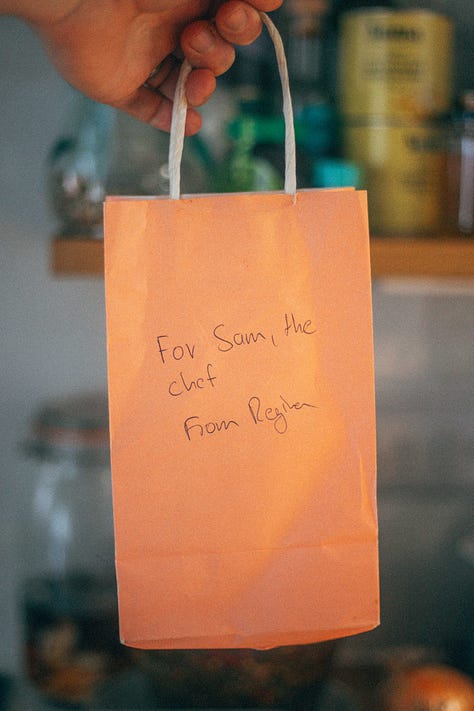
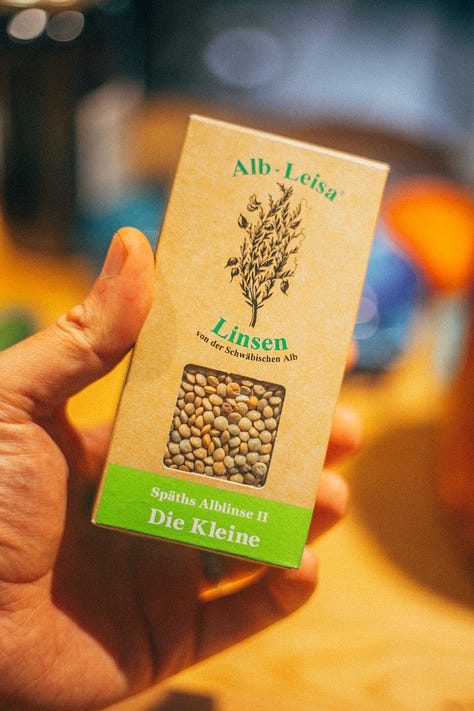
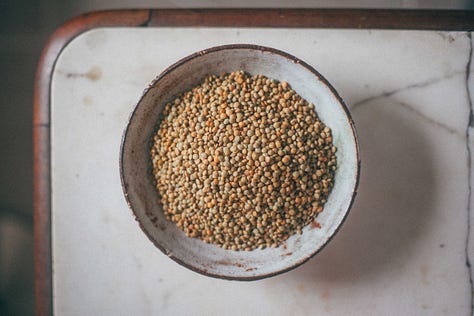
When I picked up the bag she’d left for me at the shop, I learned her name was Regina, which I think I once knew before, many years ago. I don’t think she has any idea about The Black Butter Club or much of the online stuff I get up to, but I wanted to share the story of her kindness and the thoughts it sparked in me. Another act of giving, more ripples.
The more I think about it, the more I believe hospitality is not about perfection but about participation. It’s not about linen napkins or perfect plating or even politeness. It’s about being part of that circular motion of giving and receiving; with food, with soil, with each other. It’s about the willingness to be present when someone steps across your threshold, to recognise that they too carry a world within them.
When I cook now, whether for friends, family, or the odd visitor who wanders into my kitchen, I try to hold onto that feeling. The guest is god. The guest is also me. We are hosts and guests in equal measure, forever changing places. The microbes that ferment our food are our invisible guests. The seeds we save are the hosts of future harvests. The soil welcomes the compost, the rain welcomes the drought’s end, and the land, in its silent generosity, teaches us what it means to be welcoming at all.
Maybe that’s what hospitality truly means, not simply to open our homes, but to open our lives. To leave a space for the unexpected. To treat each encounter, each meal, each exchange of care as sacred in its own small way.
The Alb lentil’s story is, at its core, a story of hospitality. The seed bank kept it safe when no one else cared. A farmer took it in, nurtured it, shared it. A writer told its story. A reader remembered it. A cook once mentioned that book to a guest, and years later, that guest brought the seed back to the cook. Each step required someone to make space, to welcome, to tend, to share.
That is hospitality. More than a service industry, it’s an ecosystem of care.
The guest is god not because they are to be worshipped, but because in their presence we find our own capacity for generosity. We become more human when we welcome, richer when we share. The world feels less like a competition and more like a table, long, worn, mismatched perhaps, but sturdy, with plenty of room still at the edges.
And I think this is what it means to feed people. This is what it means to live hospitably. To make room for connection, however it chooses to arrive. And have faith that hospitality travels in circles, from soil to table, and back again.
A Note to You, Reader
I’d love to hear what hospitality means to you. What gestures, however small, have stayed with you over the years? A meal shared, a kindness remembered, a door left open when you needed one most? Tell me in the comments below.
And, in the same spirit of hospitality, if this essay moved you, please share it. Pass it along to someone who might find warmth or reflection in it. That simple act of sharing keeps the circle alive.
As a closing word, I’m sometimes asked what first got me into food, and I feel like this article is the most fitting place to mention it. I often think of my childhood, and how my mum would always make time to cook our meals from scratch, despite working insane hours to support my brother and I single-handedly. There were (and still are) many ways she’s looked after us, but food is the one that really stuck. Nobody makes better roast potatoes, casseroles, or shortcrust pastry. In fact, despite all the chefs, cooks, and bakers I’ve had the pleasure of working with, I’d say it’s my mum’s pastry I’m chasing every time I reach for a bag of flour.
I don’t often share much personal stuff online, I’d usually rather share the thoughts, techniques, and flavours of my kitchen than rattle on about the meals of my childhood. But I know she reads these articles, and this one felt like the right place to say thank you. My food journey started with her. So, if you feel like your life has benefited in some small way from what I share here or in my books, raise a glass next time you’re enjoying a great meal. She’s the one who lit the stove.
Thank you for reading, and let me know your favourite way to cook lentils down below.
Warmly,
Sam
P.S. Dedicated to Mum, whose pastry remains undefeated.



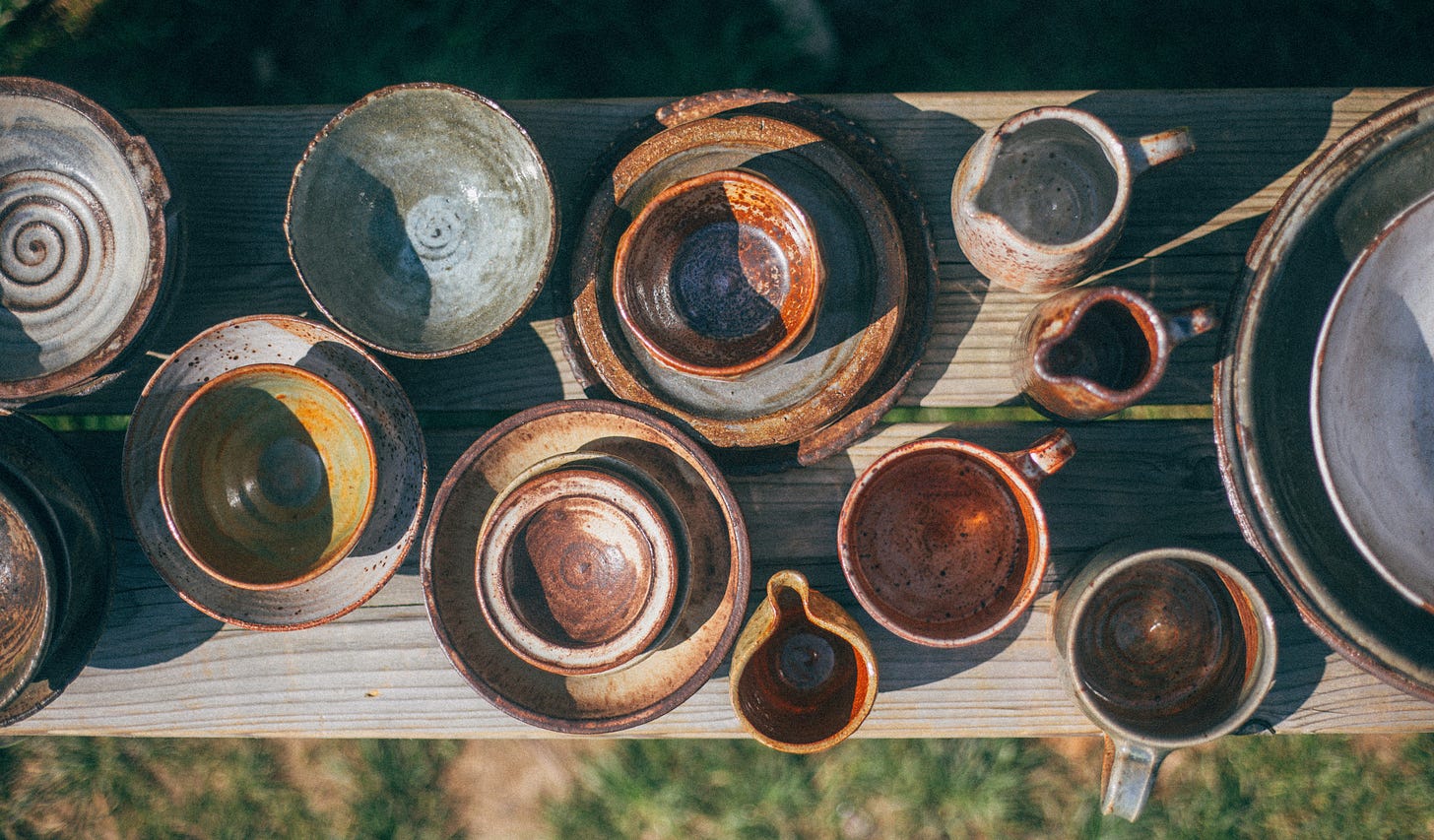
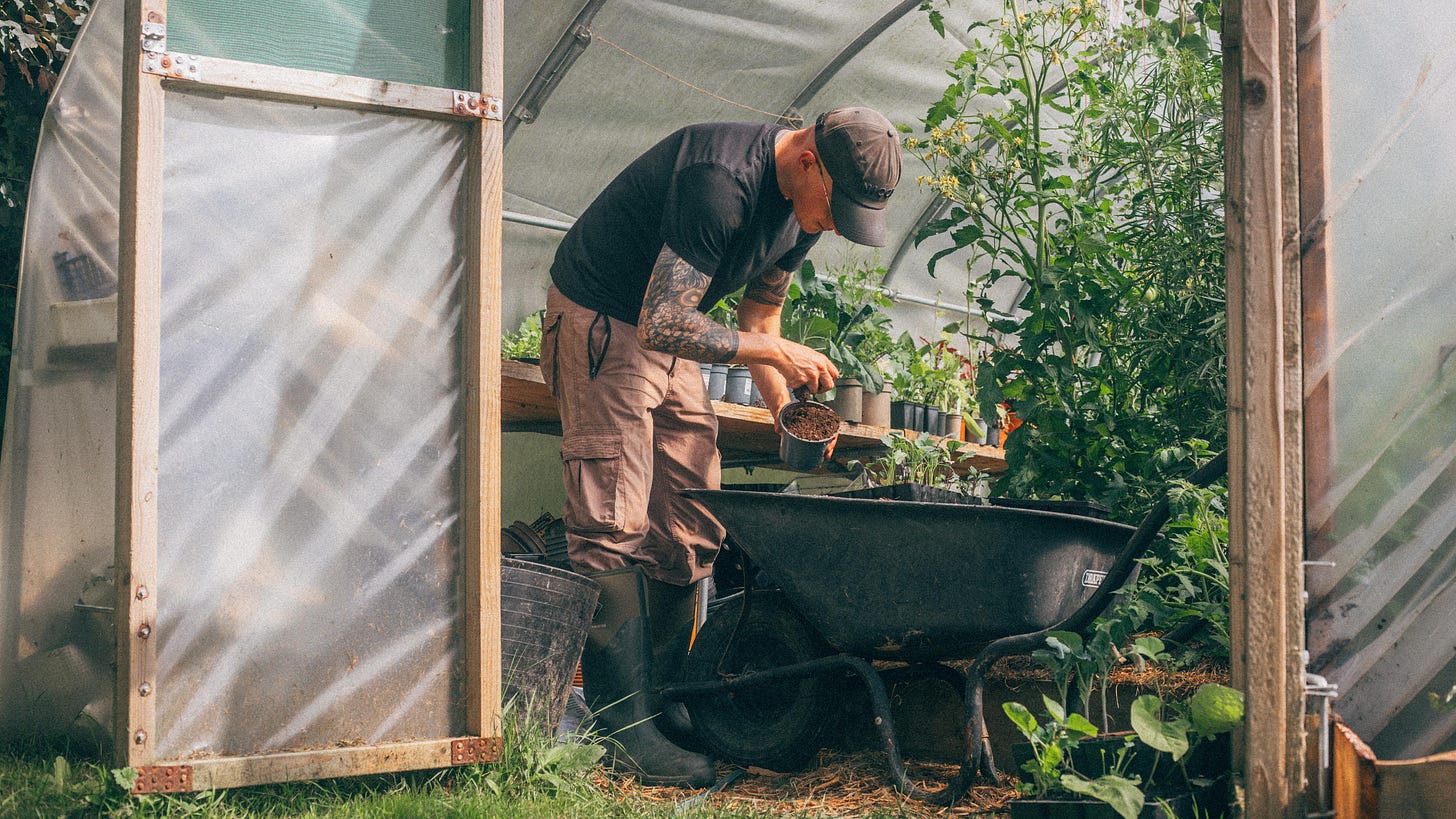

An inspiring read - I e forwarded it to my grandson who after several years of mild depression , unemployment and isolation stumbled upon a small start up restaurant started as KP and now 3 years later is an accomplished cook who loves feeding people good ( where possible) local food. The transformative power of hospitality has , for him been immeasurable
Sam, this is beautiful. I love your delight in giving to others through your food. And your conscious acknowledgment that this doesn't require perfection. I adore the story about the lentils, and I'm ordering Eating to Extinction to read it myself. Thanks for the recommendation! It's so important to protect treasured heirloom foods. And I love the story about your mom too, and her cooking with love for you and your brother despite her long days at work. And her undefeated pastry! She sounds amazing. Thanks so much for sharing this wonderful piece with us. ❤️